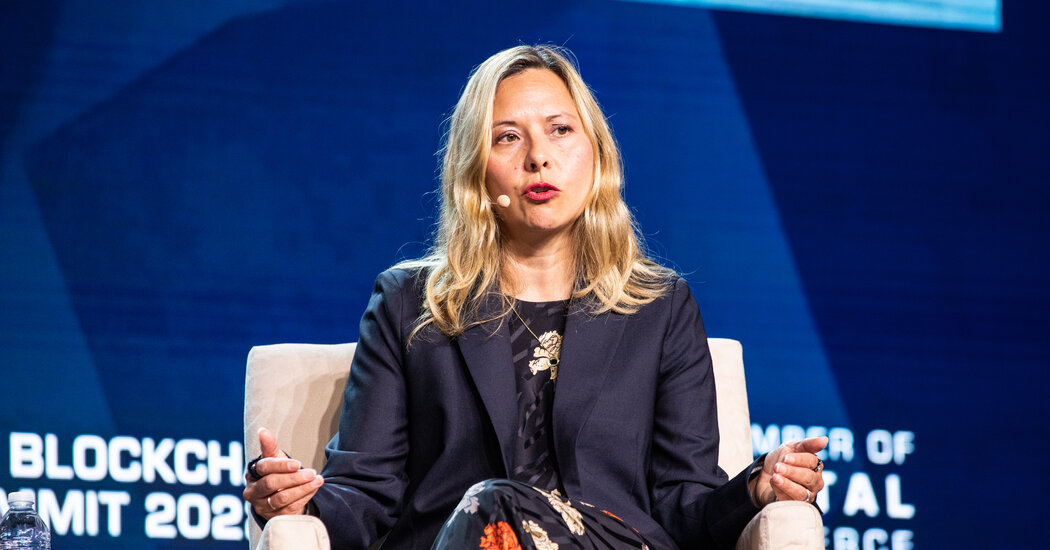Christy Goldsmith Romero, a lawyer who spent more than a decade rooting out fraud and other misconduct at banks that received federal bailouts in the run-up to the 2008 financial crisis, has been tapped to be the next head of the Federal Reserve Bank of America. Deposits, the White House announced on Thursday.
Her selection is the first step in President Biden’s effort to quickly replace the incumbent, Martin Gruenberg, the longtime head of the bank regulator, who said last month he would resign in response to reports of abuse and harassment. large in the workplace in the agency. If the Senate Banking Committee moves quickly to hold a hearing and vote on Ms. Goldsmith Romero, she has a chance to get the role before the presidential election in November.
In an emailed statement to reporters, the committee’s chairman, Sen. Sherrod Brown, D-Ohio, said Ms. Goldsmith Romero “would bring decades of financial services experience, including valuable experience, to the FDIC.”
“She has proven herself to be a strong, independent and fair regulator who is not afraid to do what is right,” he said.
Ms. Goldsmith Romero did not immediately respond to a request for comment.
Her path to work is far from certain. Ms. Goldsmith Romero, who is a member of the Commodity Futures Trading Commission, has been unanimously confirmed by the Senate twice, but her next confirmation process is already looking very different. Even before the White House announced her nomination on Thursday, Republicans appeared to be preparing to oppose her.
Representative Andy Barr of Kentucky, a Republican on the House Financial Services Committee who will not have a say in confirmation because he is not a member of the Senate, was the first to criticize her candidacy. In an emailed statement to reporters Thursday, Mr. Barr called the choice “reckless” and said Ms. Goldsmith Romero was not qualified to lead the bank’s regulator.
“Our financial institutions deserve a leader with significant, direct banking experience, not a politicized choice whose background does not match the requirements of the role,” said Mr. Barr.
If she is confirmed, Mrs. Goldsmith Romero will be the first person in nearly 20 years to become FDIC chairman without first serving as a Senate aide working on banking issues, a role seen by some in the banking industry as essential. for developing a deep familiarity with the bank’s regulatory policy. Mr. Gruenberg was a senior adviser on the Banking Committee staff for more than a decade before joining the agency. And its most recent Republican chair, Jelena McWilliams, was also a staff member on the committee.
But regulatory policy has taken a backseat to concerns over the FDIC’s workplace culture. Beginning last fall, reports from The Wall Street Journal and an outside law firm described a widespread culture of harassment and abuse by senior managers against women and junior employees. In response to these revelations, leaders in the Senate, including Mr. Brown, declared Mr. Gruenberg unsuited to the role of rooting out abuse and improving the agency’s culture and the morale of its employees.
“At this point in time, the most important qualification for an FDIC chair is someone who can restore morale and has the skills to do so,” said H. Rodgin Cohen, a senior partner at the law firm Sullivan & Cromwell. who is considered to be the foremost advocate of the finance industry.
Most of the work of Mrs. Goldsmith Romero has been with the banks in her role as special inspector general for the Troubled Asset Relief Program, the roughly $450 billion operation designed to stabilize the banking industry after the financial crisis. Ms. Goldsmith Romero and her staff investigated how banks were using their bailout funds and whether they were following rules on foreclosures and other bailout-related consumer relief efforts.
Officials in the Biden administration see her work as a watchdog as particularly important to the FDIC post. Ms. Goldsmith Romero will have to wrest power from longtime senior staffers who have helped defend peers accused of misconduct. She will also need to rebuild the confidence of new employees and convince young lawyers and accountants that the agency is a worthwhile place for them to work.
With Ms. Goldsmith Romero’s appointment, the White House also announced the president’s picks for other financial regulatory posts, including another role focused on banks, the Treasury’s assistant secretary for financial institutions. Kristin N. Johnson, another commissioner at the Commodity Futures Trading Commission, has been tapped for the role. Ms. Johnson was also considered for the FDIC position.
